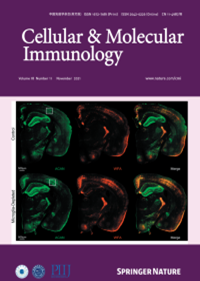The antitumor activity of TGFβ-specific T cells is dependent on IL-6 signaling
IF 21.8
1区 医学
Q1 IMMUNOLOGY
引用次数: 0
Abstract
Although interleukin (IL)-6 is considered immunosuppressive and tumor-promoting, emerging evidence suggests that it may support antitumor immunity. While combining immune checkpoint inhibitors (ICIs) and radiotherapy in patients with pancreatic cancer (PC) has yielded promising clinical results, the addition of an anti-IL-6 receptor (IL-6R) antibody has failed to elicit clinical benefits. Notably, a robust TGFβ-specific immune response at baseline in PC patients treated solely with ICIs and radiotherapy correlated with improved survival. Recent preclinical studies demonstrated the efficacy of a TGFβ-based immune modulatory vaccine in controlling PC tumor growth, underscoring the important role of TGFβ-specific immunity in PC. Here, we explored the importance of IL-6 for TGFβ-specific immunity in PC. In a murine model of PC, coadministration of the TGFβ-based immune modulatory vaccine with an anti-IL-6R antibody rendered the vaccine ineffective. IL-6R blockade hampered the development of vaccine-induced T-cells and tumoral T-cell infiltration. Furthermore, it impaired the myeloid population, resulting in increased tumor-associated macrophage infiltration and an enhanced immunosuppressive phenotype. In PC patients, in contrast to those receiving only ICIs and radiotherapy, robust TGFβ-specific T-cell responses at baseline did not correlate with improved survival in patients receiving ICIs, radiotherapy and IL-6R blockade. Peripheral blood immunophenotyping revealed that IL-6R blockade altered the T-cell and monocytic compartments, which was consistent with the findings in the murine model. Our data suggest that the antitumor efficacy of TGFβ-specific T cells in PC depends on the presence of IL-6 within the tumor. Consequently, caution should be exercised when employing IL-6R blockade in patients receiving cancer immunotherapy.

tgf β特异性T细胞的抗肿瘤活性依赖于IL-6信号。
虽然白细胞介素(IL)-6被认为是免疫抑制和肿瘤促进,新证据表明它可能支持抗肿瘤免疫。虽然联合免疫检查点抑制剂(ICIs)和放射治疗胰腺癌(PC)患者已经产生了有希望的临床结果,但添加抗il -6受体(IL-6R)抗体未能引起临床益处。值得注意的是,仅接受ICIs和放疗的PC患者在基线时出现强大的tgf β特异性免疫反应与生存率的提高相关。最近的临床前研究证实了一种基于tgf β的免疫调节疫苗在控制PC肿瘤生长方面的有效性,强调了tgf β特异性免疫在PC中的重要作用。在这里,我们探讨了IL-6对PC中tgf β特异性免疫的重要性。在小鼠PC模型中,以tgf β为基础的免疫调节疫苗与抗il - 6r抗体共同使用可使疫苗无效。IL-6R阻断阻断了疫苗诱导的t细胞的发展和肿瘤t细胞的浸润。此外,它损害髓细胞群,导致肿瘤相关巨噬细胞浸润增加和免疫抑制表型增强。在PC患者中,与仅接受ICIs和放疗的患者相比,基线时强大的tgf β特异性t细胞反应与接受ICIs、放疗和IL-6R阻断的患者的生存率提高无关。外周血免疫表型分析显示IL-6R阻断改变了t细胞和单核细胞区室,这与小鼠模型的结果一致。我们的数据表明,tgf β特异性T细胞在PC中的抗肿瘤功效取决于肿瘤内IL-6的存在。因此,在接受癌症免疫治疗的患者中使用IL-6R阻断剂时应谨慎。
本文章由计算机程序翻译,如有差异,请以英文原文为准。
求助全文
约1分钟内获得全文
求助全文
来源期刊
CiteScore
31.20
自引率
1.20%
发文量
903
审稿时长
1 months
期刊介绍:
Cellular & Molecular Immunology, a monthly journal from the Chinese Society of Immunology and the University of Science and Technology of China, serves as a comprehensive platform covering both basic immunology research and clinical applications. The journal publishes a variety of article types, including Articles, Review Articles, Mini Reviews, and Short Communications, focusing on diverse aspects of cellular and molecular immunology.

 求助内容:
求助内容: 应助结果提醒方式:
应助结果提醒方式:


